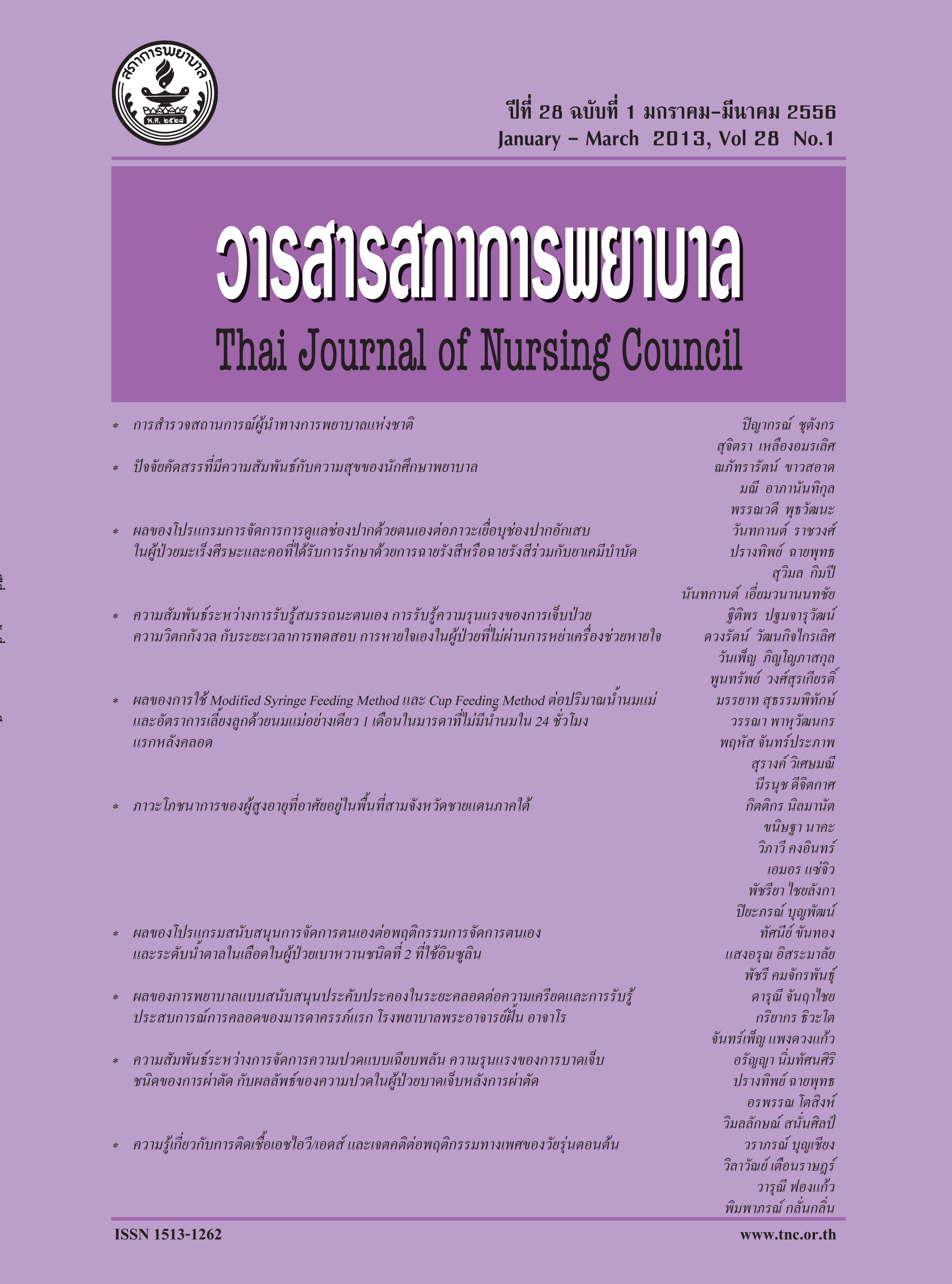การสำรวจสถานการณ์ผู้นำทางการพยาบาลแห่งชาติ
Keywords:
ผู้นำทางการพยาบาล การสำรวจสถานการณ์แห่งชาติ Nursing Leaders nationwide surveyAbstract
การสำรวจสถานการณ์ผู้นำทางการพยาบาลแห่งชาติ
ปิญากรณ์ ชุตังกร
สุจิตรา เหลืองอมรเลิศ
บทคัดย่อ: การวิจัยครั้งนี้ มีวัตถุประสงค์เพื่อสำรวจสถานภาพส่วนบุคคล สถานการณ์การบริหาร การทำงาน ทัศนะของผู้บริหาร และสภาวะสุขภาพ ของผู้บริหารการพยาบาลทั้งระบบบริการและสถาบันการศึกษา ทั้งภาครัฐและเอกชน ประชากร เป็นผู้นำทางการพยาบาลในระบบบริการทั้งภาครัฐและเอกชน จำนวน 1,445 คน ผู้นำทางการพยาบาลในระบบการศึกษา ทั้งภาครัฐและเอกชน จำนวน 79 คน เครื่องมือในการวิจัย เป็นแบบสอบถามที่สร้างขึ้นจากการทบทวนวรรณกรรมและหาความตรงของเครื่องมือโดยผู้เชี่ยวชาญจำนวน 5 คน ข้อคำถามเป็นคำถามปลายเปิดและปลายปิด โครงการวิจัยนี้ ผ่านการรับรองจากคณะกรรมการวิจัยจริยธรรมในมนุษย์ของสภาการพยาบาล เลขที่ 3/2554 วันที่ 30 มิถุนายน 2554 แบบสอบถามได้รับคืนจากผู้บริหารการพยาบาลทั้งหมด 829 ฉบับ คิดเป็นร้อยละ 54.4 การวิเคราะห์ข้อมูลใช้สถิติเชิงบรรยาย และวิเคราะห์เชิงเนื้อหา
ผลการวิจัย พบว่า
1. ผู้นำทางการพยาบาลส่วนใหญ่อายุ 46-50 ปี และ 51-55 ปี ร้อยละ 29.9 และ 26.1ตามลำดับ เงินเดือนที่ได้รับส่วนใหญ่ ร้อยละ 42.6 น้อยกว่า 40,000 บาท การดำรงตำแหน่งผู้บริหาร 10 ปีขึ้นไป ประสบการณ์ทำงาน 20 ปีขึ้นไป ร้อยละ 86.5 การเข้าสู่ตำแหน่งบริหารโดยการแต่งตั้งมากที่สุด ร้อยละ 64.1
2. ผู้นำทางการพยาบาลอบรมด้านบริหารจัดการระยะสั้น ร้อยละ 40.3 ขณะดำรงตำแหน่งพัฒนาความรู้ด้านระบบคุณภาพภายในองค์กร และการวางแผนกลยุทธ์ สมรรถนะการบริหารจัดการที่ใช้ของผู้บริหาร คือ การบริหารความเสี่ยง การสร้างสัมพันธภาพระหว่างบุคคล และทีมงาน การจัดการความรู้ และการวางแผนกลยุทธ์ ร้อยละ 11.3 , 9.6 , 9.5 และ 9.0 ตามลำดับ รวมทั้งการคิดและแก้ปัญหาอย่างเป็นระบบการบริหารการเปลี่ยนแปลง ร้อยละ 21.2 และ 19.0 ตามลำดับ
3. ทัศนะของผู้นำทางการพยาบาลประกอบด้วย ประเด็นท้าทาย คือ การขาดแคลนบุคลากร ความขัดแย้งในองค์กร การสื่อสารภายในองค์กร แนวทางแก้ไขปัญหา คือ การวางแผนอัตรากำลัง การสร้างขวัญกำลังใจ เพิ่มค่าตอบแทนและสวัสดิการ การมีมนุษยสัมพันธ์ที่ดี การบริหารโดยใช้หลักธรรมาภิบาล การเตรียมผู้บริหารในอนาคต คือ การเตรียมความพร้อมในการเข้าสู่ตำแหน่ง ผู้มีประสบการณ์ และวิสัยทัศน์กว้างไกล เป็นผู้มีคุณธรรมและจริยธรรม และมีการคัดเลือกที่เหมาะสม ภาวะสุขภาพของผู้นำ อยู่ในระดับที่ดี ทั้งด้านร่างกาย จิตใจ และสิ่งแวดล้อม
การจัดการศึกษาเพื่อเตรียมผู้นำและเน้นสมรรถนะสำคัญ ทั้งด้านการบริหารจัดการและความเป็นผู้นำการหามาตรการเพิ่มค่าตอบแทนผู้บริหารทางการพยาบาลให้เท่าเทียมเหมาะสมกับความรับผิดชอบในตำแหน่ง
วารสารสภาการพยาบาล 2556; 28(1) 05-18
คำสำคัญ: ผู้นำทางการพยาบาล การสำรวจสถานการณ์แห่งชาติ ประเทศไทย
A Nationwide Survey of Nursing Leaders
Piyakorn Chutangkorn RN,M.Ed*
Suchittra Luangamornlert RN,DNSc.**
Abstract: Objective: To conduct a nationwide survey of personal statuses, administrative situations,professional conditions, administrative views and health conditions of nursing leaders in the service-providing organisations and educational institutions of both the public and private sectors.
Research Type: Survey research.
Research Procedure: The sample population consisted of 1,524 nursing leaders in both the public and private sectors, 1,445 in the service-providing system and the other 79 in the educational system. The instrument used to collect research data was a questionnaire developed
based on the reviewed literature. Of all the distributed copies of the questionnaire, 829 (54.4%) were returned. The data were analysed using descriptive statistics and content analysis approach.
Research Findings:
1. The majority of the responding nursing leaders belonged to two respective age groups,46-50 (29.9%) and 51-55 (26.1%). Almost half of the leaders (42.6%) were paid a salary of under THB 40,000. Most of them (86.5%) had 20 years or more of professional experience and 10 years or more of administrative experience. More than half (64.1%) took administrative office by means of appointment.
2. Less than half of the leaders (40.3%) had completed a short administrative training course. For improvement of intra-organisational knowledge management and administrative performance and strategy planning, 11.3% of the leaders, whilst in office, had attended training courses in risk management, 9.6% in interpersonal and working group relations, 9.5% in knowledge management and 9.0% in strategy planning. Besides, 21.2% had attended training sessions in organised thinking and problem solving, and 19.0% in change management.
3. The administrative views were classified into (a) challenges; (b) means of solution;(c) preparation of future administrators; and (d) leaders’ health conditions. The main challenges identified included a shortage of personnel, intra-organisational conflict and lack of intraorganisational communication. The suggested means of solution were workforce planning,provision of support and encouragement, increase in emolument and perquisites, good interpersonal relations and good governance. In terms of preparation of future administrators, pre-office preparation sessions, proper experienc, visions and far-sightedness, morality and integrity, and proper selection methods were recommended. Finally, the leaders’ health conditions were identified as physically,mentally and environmentally sound.
Recommendations: Education on nursing leaders preparation is recommended, with an emphasis on key areas of administrative performance and leadership. In addition, a decent, position-honoured increase in nursing administrators’ emolument is suggested.
Thai Journal of Nursing Council 2013; 28(1) 05-18
Keywords: nursing leaders; nationwide survey








